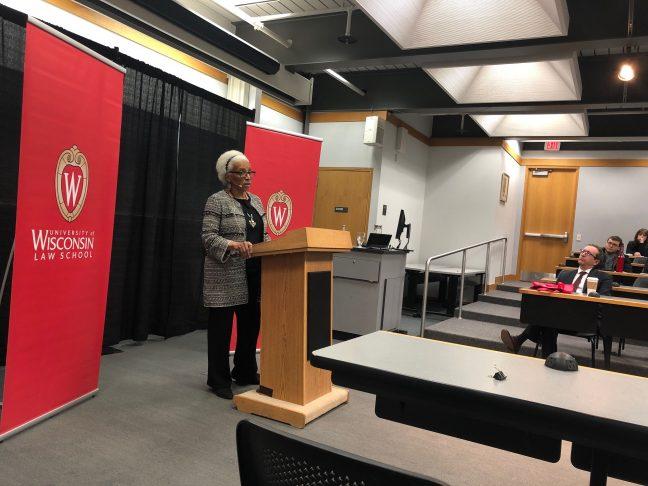Justice Geraldine Hines came to University of Wisconsin’s Law School Wednesday night to examine the connection between police brutality and the Constitution.
Hines, an alumnus of UW’s Law School and a former associate of the Massachusetts Supreme Judicial Court, discussed what she learned about racialized policing throughout her career.
Racialized policing involves the use of racial profiling and excessive force towards people of color, Hines explained, and it’s important to discuss these practices to “preserve the integrity of our justice system.”
“Policing in America has exacerbated the crisis of confidence and integrity of our justice system,” Hines said. “The way in which people of color are policed has come to be the most visible reminder of the unrelenting racial inequality that tears at the fabric of our democracy.”
Hines said legal professionals must monitor government policies like racializing policing that undermine “the core value” of equality for all of the U.S.
Persistent police brutality, which can be traced all the way back to slavery, has caused a lack of trust in the law, Hines said, making discussions like these all the more urgent.
Hines said the Fourth Amendment, which ideally should protect the public against unreasonable search and seizure, validates racial profiling in reality.
Because of past Supreme Court cases like Terry v. Ohio, Hines said the Fourth Amendment has been able to solidify racial profiling.
Terry v. Ohio was a case from 1967 where two black men were frisked by police after they observed them stop in front of a store window repeatedly. Two revolvers were found in the men’s overcoats, resulting in the men being charged with carrying concealed weapons.
The defense moved to suppress the weapons charges, arguing that they were found in an illegal search. The court denied the motion, however, arguing that the police officers had probable cause to search them.
Hines said this decision was indicative of deeper issues.
“The court’s unwillingness to consider the racial impact of stop-and-frisk and its interpretation of the Fourth Amendment was not altogether unexpected,” Hines said. “The unspoken history was that the backdrop of the Terry case should’ve been a warning that the court would elevate the interests in crime prevention over any concern about racial consequences of the decision.”
Allowing police to search people of color based on suspicion is dangerous. Many fatal encounters begin with minor traffic stops, Hines said.
Hines warned against limiting protections of the Fourth Amendment, saying that the experiences of black people needs to be taken into account when making legal decisions.
“Just as there were fights for me when I left Madison in 1971, there’s a world of fights out there for you to get engaged in,” Hines said. “And this is one of them.”


